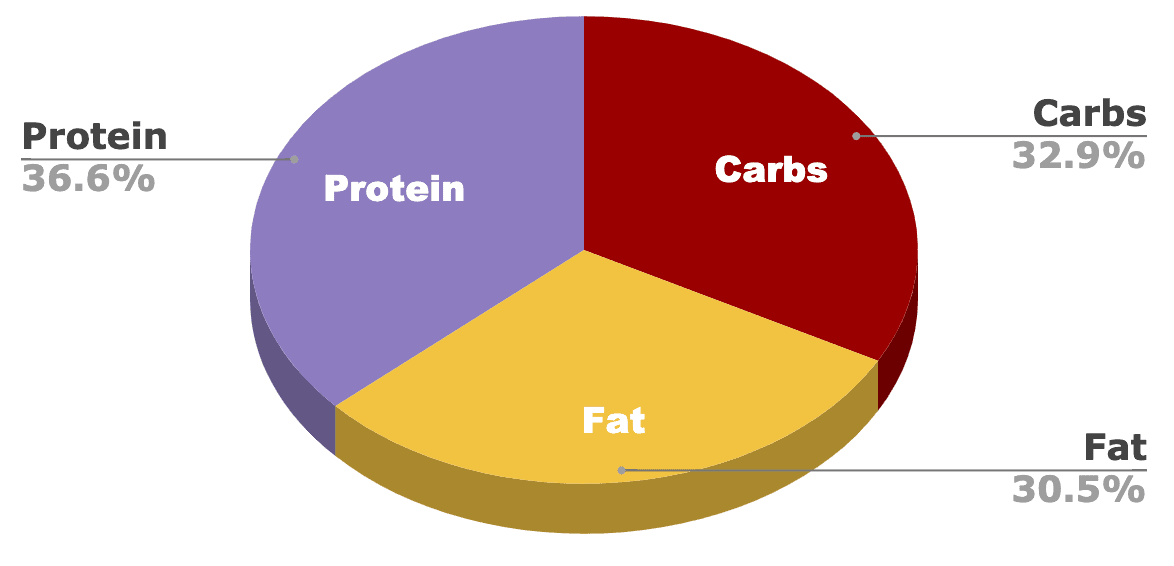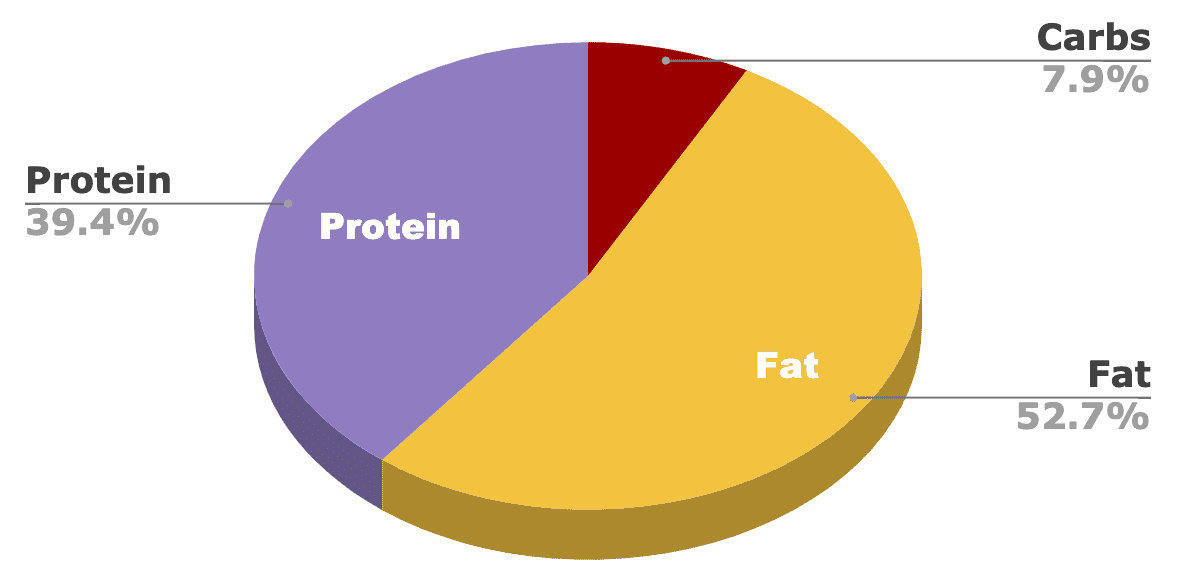Special Kitty Cat Food Review Summary
We give Special Kitty cat food a rating of 4 out of 5 stars.
Special Kitty Cat Food Introduction
Walmart is known for many things. It sells affordable products that allow regular people to make ends meet, but it’s not exactly known for having the highest-quality offerings. That also sums up its store-brand cat food, Special Kitty.
Special Kitty is a budget food. It’s often sold in bulk, as you can buy 44-pound bags of dry kibble, which is unusual for a cat food. Therefore, it’s best suited for people who can’t afford to spend much on their cat’s diet or those who are struggling to feed a large number of cats, such as shelters or rescue groups.
However, all that value comes with a downside: your cat’s nutrition. There’s not much in it worth recommending since it’s full of cost-cutting ingredients, like animal by-products, corn, and soybeans.
The brand isn’t forthcoming with information about its practices either. As best we can tell, it is manufactured in the United States, but the manufacturer (J.M. Smucker) doesn’t exactly have a sterling reputation.
Your cat won’t go hungry eating Special Kitty, but they won’t reach their full potential on it either.
At a Glance: The Best Special Kitty Cat Food Recipes:
| Image | Product | Details | ||
|---|---|---|---|---|
| Our Favorite |

|
Special Kitty Naturals Dry |
|
CHECK PRICE |

|
Special Kitty Pâté Wet Food |
|
CHECK PRICE | |
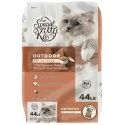
|
Special Kitty Outdoor Formula |
|
CHECK PRICE | |

|
Special Kitty Complete |
|
CHECK PRICE | |

|
Special Kitty Cuts in Gravy |
|
CHECK PRICE |
Special Kitty Cat Food Reviewed
Who Makes Special Kitty and Where Is It Produced?
Special Kitty is a Walmart-exclusive line, and it’s difficult to find much information on its manufacturing history. It appears that the manufacturer has changed several times, but J.M. Smucker currently makes it.
J.M. Smucker owns several manufacturing facilities in Alabama, Kansas, and New York. We’re not sure which one Special Kitty is made in, but all of the facilities make inexpensive, mass-produced pet foods like Meow Mix, 9Lives, and Kibbles ‘n Bits.
Special Kitty was previously owned by Mars PetCare, Doane Pet Care, and Big Heart Pet Brands. Some of the companies produced the food overseas (including China), but it doesn’t look as if J.M. Smucker does so today.
Which Types of Cats Is Special Kitty Best Suited For?
It’s difficult to honestly review budget foods like Special Kitty without sounding elitist. We understand that not everyone can afford to give their cat top-of-the-line foods, and we also believe that everyone should be able to experience the joys of pet ownership, regardless of their financial situation.
However, the only reason to buy Special Kitty is if you’re strapped for cash. It has a poor nutritional profile, and there’s little reason to believe that the manufacturer is strict about quality control.
If this is the best food you can afford, buy it by all means, but if you can afford anything else, you should probably buy that instead.
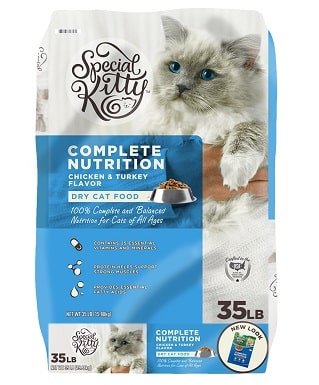
Which Types of Cats Might Do Better With a Different Brand?
Again, this question is difficult to answer without appearing as a snob. However, facts are facts: virtually every cat will do better with a different brand.
It all depends on what you can afford. If you want a budget-friendly food that’s much better for your cat than Special Kitty, we’d recommend Rachael Ray Nutrish Indoor Complete.
Discussion of the Primary Ingredients in Special Kitty Cat Food
Cat Food Fillers
Special Kitty’s dry foods are mostly composed of fillers. That is to say, they’re made of cheap ingredients that add bulk to the food without adding any nutritional value. Ground yellow corn is usually the first ingredient, followed closely by corn gluten meal. That’s a problem because cats are carnivores; their diet should primarily be meat, not vegetables.
Unfortunately, meat costs more than corn, so it’s cheaper for the manufacturer and the consumer to fill the cat food with corn. Think about a cat in the wild. If they found themselves in a cornfield, they’d focus more on the mice or birds than the plants.
As a result, cats have never developed a way to process corn, so it shouldn’t be included in their food.
Cat Food Animal By-Products
In most cases, meat is one of the first few ingredients listed, but unfortunately, the meat is usually animal by-products. Animal by-products are pieces of meat that weren’t suitable for other uses, but in order to save money, the manufacturers will pile them all together and put them in low-cost foods. There is a fair amount of nutrients inside, but you have no idea what else might be there.
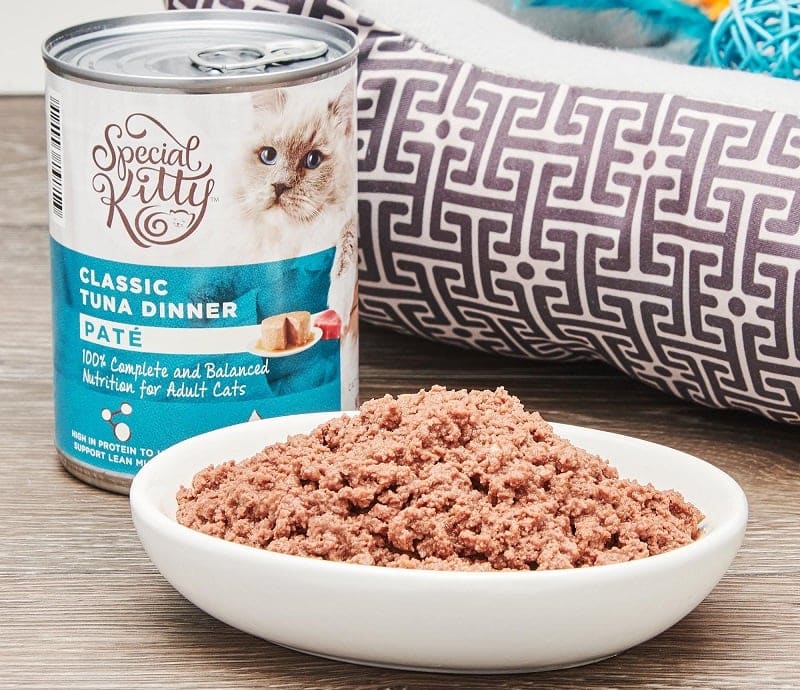
The actual definition of animal by-products states that they include “carcasses and parts of carcasses from slaughterhouses, animal shelters, zoos, and veterinarians, and products of animal origin not intended for human consumption, including catering waste.” So, you might have meat from long-dead and diseased animals inside, which isn’t good for your cat.
If you think of a cat in the wild, would they be catching fresh prey or scavenging on a days-old carcass? Cats are excellent hunters and haven’t evolved a hardy enough stomach to scavenge. As a result, animal by-products can be challenging for them to digest.
Cat Food Meals
“Meals” are foods that are made by mashing up several ingredients together. For example, chicken meal contains various parts of the bird—including bones and organ meat—combined into a single substance.
They may sound gross, but they provide an assortment of nutrients not often found in lean cuts of meat. If used appropriately, they can be important parts of any cat’s diet.
Unfortunately, Special Kitty uses odd ingredients like soybean meal. It includes several parts of the soybean, which wouldn’t be a problem if it weren’t for the fact that cats shouldn’t be eating soybeans at all.
You’ll also find animal by-product meals. Again, meals are usually good, but when they’re made from piles of rotten meat, you’re better off avoiding them entirely.
The Nutritional Splits Are Actually Respectable
If you ignore what goes into the food and look at the percentages on the label, Special Kitty doesn’t seem so bad. Their dry foods are usually in the range of 30% protein, 10% fat, and 5% fiber; these are not outstanding numbers to be sure, but nothing to turn up your nose at either.
Your cat will get most of the nutrition that they need from this food, so you don’t need to worry about them getting malnourished or anything like that.
Its Canned Food Is a Bit Better
You’ll see water as the first ingredient if you check out the labels on one of its canned foods. This is fairly typical for wet cat foods (it has to get wet somehow, after all), and since most cats don’t drink enough water, giving them plenty of moisture is always a good idea.

After that, the next ingredient is usually an organ meat, like liver. While you might not care for liver, your cat will love it, and it’s full of all sorts of nutrients that aren’t found in leaner cuts of meat. Seeing it listed so highly on these labels is a good thing.
Once you get past the liver, you’ll find fillers like wheat gluten, soy flour, modified food starch, and animal by-products.
You may also find other proteins like tuna or ocean whitefish, but they will be in limited quantities. Overall, it appears that its wet foods are made by taking a bit of good meat and caking it in fillers and cheaper cuts of meat.
It Has a Limited Number of Special Recipes
Special Kitty hits all the basic notes when it comes to special recipes, as it has both indoor and outdoor cat formulas, as well as foods designed for kittens. Beyond that, the pickings are slim.
It doesn’t have a dedicated senior formula, weight management, or sensitive stomach options. It has a “complete nutrition” option and a “naturals” line, which is its high-end option. It’s the best of the bunch but mainly involves shuffling around cheap ingredients.
If your cat has any special dietary needs, don’t expect Special Kitty to be able to accommodate them.
Despite Its Flaws, Cats Seem to Love the Taste
Most cats gobble Special Kitty up, and you shouldn’t have any difficulty convincing your cat to eat it. There are hundreds of user reviews on Walmart’s website attesting to the fact that cats find it delicious.
Of course, the problem is that it’s a very calorie-dense food, so you’ll have to be strict about portion control. Otherwise, you’ll have an obese cat on your hands and all the health problems that come with it.
Special Kitty Is Tremendously Popular
Special Kitty is the top-selling cat food in the United States by an overwhelming amount; it’s corralled nearly 20% of the overall cat food market. That’s more than every other brand combined. It’s not surprising since Walmart is the top retailer in America, and many owners jump at the chance to give their cats cheap food they’ll actually eat.
But just because something is popular doesn’t mean it’s a good idea, and feeding your cat Special Kitty is not an exception to that rule.
Feeding your cat a high-quality diet is important for keeping them healthy and happy. But it goes beyond the food you choose; the dishes they use also matter. The Hepper NomNom Cat Bowl is our favorite for its unique, five-star design that protects from whisker fatigue and promotes good posture which also aids in better digestion. As an added bonus, it’s beautifully crafted and offers a modern take on the traditional cat bowl that fits seamlessly with all home stylings. Learn more about the NomNom by clicking here. At Catster, we’ve admired Hepper for many years and decided to take a controlling ownership interest so that we could benefit from the outstanding designs of this cool cat company!

A Quick Look at Special Kitty Cat Food
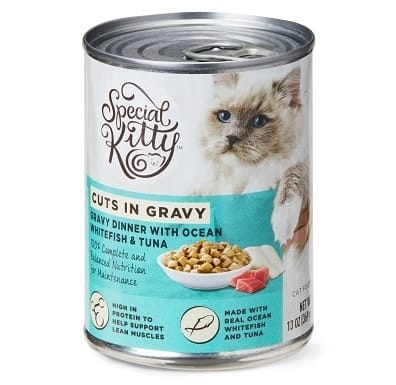
- Budget-friendly
- Sold in bulk
- Cats love the taste
- Decent nutritional profile
- Loaded with cheap fillers
- Uses tons of animal by-products
- Little in the way of lean, healthy meat inside
- Limited variety of recipes available
Special Kitty Cat Food Recalls
Whenever you’re making cheap food, more emphasis is placed on cutting costs than following every rule to the letter. As a result, budget food manufacturers are often more prone to recalls than other food companies, and Special Kitty is no exception.
The first recall happened in 2007. Special Kitty was part of the Great Melamine Recall, where hundreds of pet foods were recalled because they’d been tainted with melamine, a toxic chemical in plastics. These tainted foods (all of which were made at a single factory in China) were responsible for the deaths of hundreds of pets.
It was recalled again a year later for potential salmonella contamination, and in 2017, a recall was issued due to a lack of thiamine. Both of these could be fatal to cats, but no illnesses or deaths were traced back to the affected foods.
It’s important to note that the recalls happened before J.M. Smucker took over production. However, Special Kitty had one recall under J.M. Smucker’s watch in December 2019, as some of its canned foods “didn’t meet the company’s quality and safety standards.” J.M. Smucker said that eating the foods could “cause nausea with excessive salivation, diarrhea or vomiting to more severe symptoms, including difficulty walking, seizures, and in extreme situations, death.”
It’s also worth noting that many of J.M. Smucker’s other brands have also been recalled. In fact, it issued three different recalls between 2018 and 2020 alone, so it doesn’t look like its manufacturing standards are as strict as you might hope.
Reviews of the 3 Best Special Kitty Cat Food Recipes
1. Special Kitty Naturals Dry Cat Food — Our Favorite
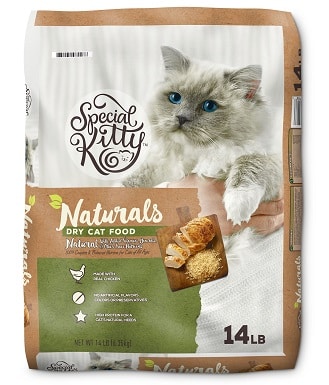
This is Special Kitty’s high-end brand, and there’s no doubt that it’s the best food that it makes. However, you’ll find the same questionable ingredients in all its other foods, like animal by-products and cheap fillers. With the Naturals line, the order is mixed up, so animal by-products are listed first rather than third or fourth. It’s not much better, but it’s better than nothing.
The overall protein levels are good, clocking in at 38%, and there is real chicken inside; it’s just the eighth ingredient listed. The fiber and fat levels are lower than we’d like (at 3% and 13%, respectively), but neither number is unforgivable. There’s brewer’s rice inside, which should help offset any upset stomachs caused by all the corn and wheat.
Special Kitty Naturals is not a great food, but it’s the best Special Kitty has to offer.
Calorie Breakdown:
- Made with real chicken
- High protein levels
- Meat is first ingredient
- Brewer’s rice is gentle on tummies
- Loaded with fillers and animal by-products
- Chicken is eighth ingredient listed
- Fiber and fat levels are low
2. Special Kitty Pâté Wet Food Classic Variety Pack
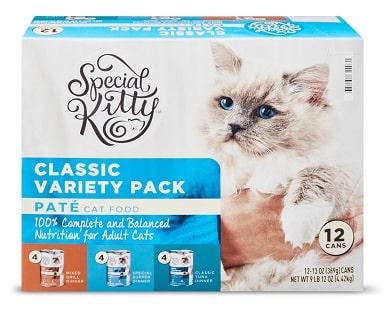
If you want to feed your cat wet food instead of (or in addition to) dry kibble, Special Kitty produces this wet food variety pack. There are three recipes in each box: usually tuna, mixed grill, and something called “special supper.” This allows you to change up your cat’s meals and prevent them from getting bored.
The first ingredients are the same for all recipes: water and meat by-products. The water is good, as cats need moisture, and having meat by-products listed as one of the first two ingredients is better than having corn or wheat listed there.
There’s also real meat in these cans (usually chicken and fish), but it’s pushed down the ingredients list. Chicken by-products are ranked ahead to go along with the “meat by-products.”
The formula has a decent amount of protein at 10%, but there are not many essential nutrients, like taurine, inside. As a result, you should pair it with a well-balanced kibble, but spending extra money on two brands defeats the purpose of buying Special Kitty.
Calorie Breakdown:
- Variety of recipes staves off boredom
- First ingredients are meat and water
- Real meat included in the recipe
- Packed with animal by-products
- Needs to be paired with well-balanced kibble
3. Special Kitty Outdoor Formula Dry Cat Food
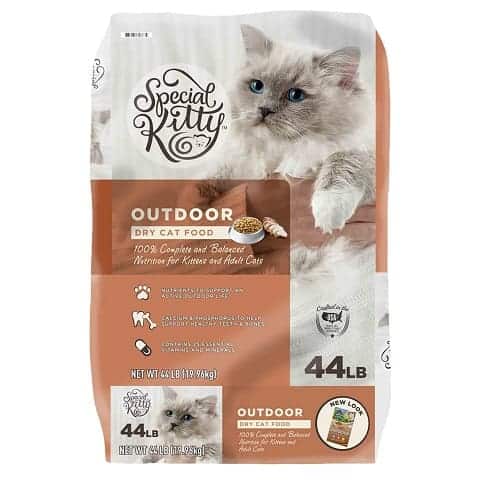
If you let your cat wander outside, Special Kitty Outdoor Formula may be your best bet among the brand’s offerings. The bag promises that it has the “nutrients to support an active outdoor life.” Beyond that, we have no idea what sets it apart from its indoor cat formula.
The outdoor formula has a bit less fiber and way more carbs. In fact, carb-heavy fillers make up five of the first six ingredients listed. That will give your cat short bursts of energy but won’t provide them with anything long-lasting. It will also increase their odds of becoming obese if they aren’t very active.
The formula has 30% protein, which is on the lower side of the average, and it all seems to come from animal by-products. You will find bone meal inside, which is a nutritious but seldom-used ingredient in cat foods. The Special Kitty Outdoor Formula will definitely give your cat all the fuel that they need to zoom around for an hour or so outside.
Calorie Breakdown:
- Designed for outdoor cats
- Good for short bursts of energy
- Bone meal has important nutrients
- Stuffed to the gills with cheap fillers
- Less protein than we’d like to see
- Likely to cause obesity unless cat is very active
*We used Special Kitty Naturals calorie breakdown to represent the calories in this product*

What Other Users Are Saying About Special Kitty Cat Food
- All About Cats: “Special Kitty cat food is primarily plant-based rather than animal-based. Low-quality fillers like corn, wheat, and soy make up the majority of their dry food products and their wet foods rely heavily on meat and poultry by-products.”
- Pet Food Talk: “The ingredients in Special Kitty are low-quality … it seems that Special Kitty is regarded by consumers as a low-quality, inexpensive cat food formula that does not contain good sources of nutrition.”
- Walmart: As pet owners, we always double-check with reviews from buyers before we buy something. You can read these by clicking here.
Conclusion
Special Kitty is a cat food that’s designed to fill a specific niche: giving people with little disposable income a way to feed their cat food that they’ll love. If you simply rank it on its ability to fulfill that criterion, it’s a smashing success.
When you examine how it’s able to provide tasty, inexpensive meals, though, the wheels fall off. Its recipes are loaded with cheap fillers and low-grade meat, and your cat won’t get nearly as many high-quality nutrients from Special Kitty as they would from better food.
Feeding your cat Special Kitty is definitely better than letting them starve, but it’s a far cry from being a healthy food.
Next on your reading list:
- 10 Best Dry Cat Foods – Reviews & Top Picks
- 10 Best Wet Cat Foods in Australia – Reviews & Top Picks
Contents
- Special Kitty Cat Food Review Summary
- Special Kitty Cat Food Introduction
- At a Glance: The Best Special Kitty Cat Food Recipes:
- Special Kitty Cat Food Reviewed
- Who Makes Special Kitty and Where Is It Produced?
- Which Types of Cats Is Special Kitty Best Suited For?
- Which Types of Cats Might Do Better With a Different Brand?
- Discussion of the Primary Ingredients in Special Kitty Cat Food
- Cat Food Fillers
- Cat Food Animal By-Products
- Cat Food Meals
- The Nutritional Splits Are Actually Respectable
- Its Canned Food Is a Bit Better
- It Has a Limited Number of Special Recipes
- Despite Its Flaws, Cats Seem to Love the Taste
- Special Kitty Is Tremendously Popular
- A Quick Look at Special Kitty Cat Food
- Special Kitty Cat Food Recalls
- Reviews of the 3 Best Special Kitty Cat Food Recipes











